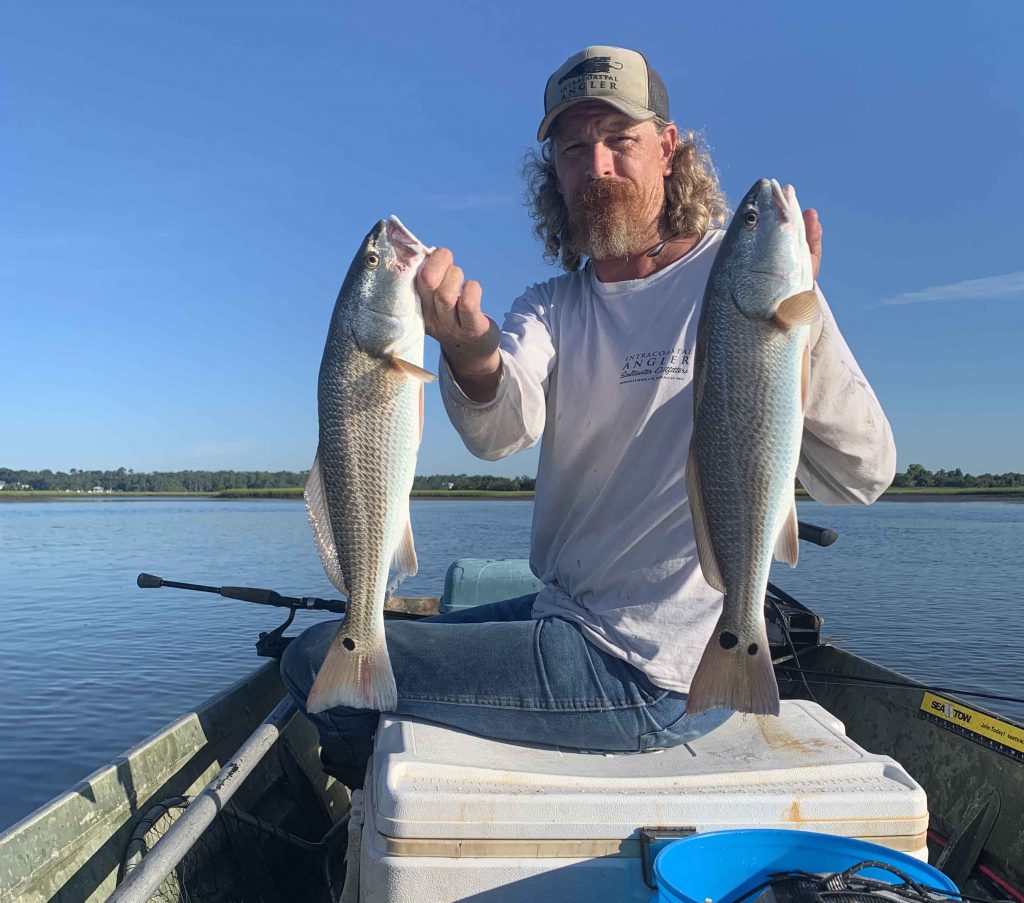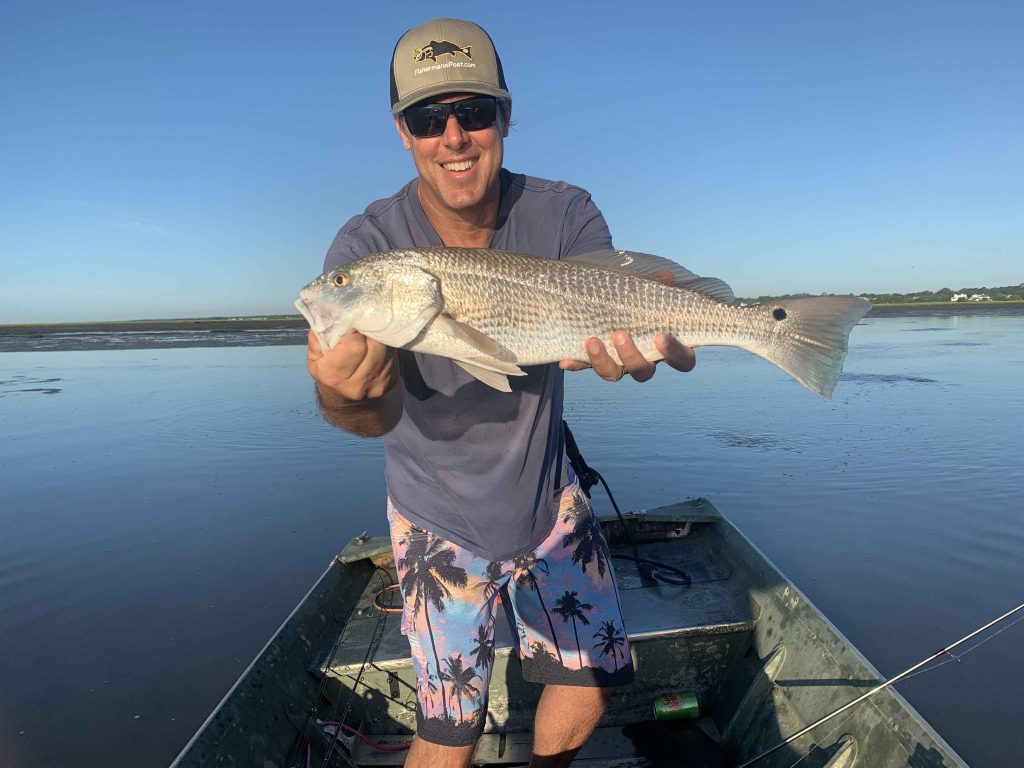Tidelines – August, 2020
When one door closes, often another door opens, and that’s what luckily happened to me—a red drum door opened—in the days leading up to our print deadline.
Fisherman’s Post was hosting registration for the Wrightsville Beach Inshore Challenge on the last Friday before we go to print when I received a text that my Sunday offshore trip had to be canceled. Offshore trips get canceled for any number of reasons, and I know this, but the problem that this cancellation created was that I was needing that trip to have something to write about for Tidelines.
I didn’t have any time to plan another trip during registration, nor any time as we hosted weigh-in the next day, and that’s when the “Marlboro Man” saved me.
Butch Davis is a popular and respected waterman in the Wrightsville area, whether it’s red drum or flounder fishing for fun or in tournaments, or (in more recent years) commercial flounder gigging to pay the bills. Butch was able to scrape up enough money for the $150 entry fee into the Wrightsville tournament (the flounder closure means that money is more than tight for Butch, even after some winter and early spring travel work of changing out signs at Home Depots across the state).
Butch unfortunately missed the 8-place leaderboard, coming in 9th place with a 6.60 red drum, but at low tide he had found a large school of reds where he had brought in red drum after red drum on every cast. Before he pulled away from weigh-in at the Wrightsville Beach Marina docks, he asked me if I wanted to go fishing the next morning to hit that same school of drum.
Yes. Yes, I do.

Butch Davis, of the “I’d Hit It” Fishing Team, holds up the results of one of many double redfish hookups in a shallow creek in the Wrightsville Beach area.
I was at the Trails End boat ramp about 10 minutes before our 6:00 am meeting time. Butch pulled up already smoking a cigarette, dropped his 14’ single wide jon boat, parked the truck, and we were off to a shallow creek in the Wrightsville Beach area.
Butch stopped inside the creek for us to throw the cast net on the wealth of baitfish being flushed out at the near low tide mark. With bait in the boat, we went further into the creek as far as the Suzuki 20 could take us, and then switched seats—me heading to the back of the boat, and Butch moving up front to sit on the cooler and operate the trolling motor.
The water was skinny, even for us, but eventually we got to the “Y” in the creek where he had found big numbers of red drum the day before. We couldn’t see anything active or pushing water as we moved between the deeper pocket of water and a nearby sandbar, but then we heard the commotion we wanted up just a little further in the distance—two separate schools of red drum visibly moving and feeding.
The water got even skinnier beyond the “Y,” so Butch pulled out his flounder gig that doubles as a push pole (the Suzuki motor, by the way, doubles as a power pole).
As we got within casting range, we each put a mullet minnow on a jig head. Butch likes fishing mullets on jig heads because he can work them like a lure.
“I’ll let the jig head sit for only a second or two,” Butch explained, “putting it where I think fish are. If nothing happens, no bite, then I start jigging the bait so that the red drum can see it better.”
We both cast out to the rippling and busy water, and within an instant we were each hooked up to redfish.
Our mullet died quickly over the hot and sunny morning, as we didn’t have a livewell, just a 5-gallon bucket, but live or dead doesn’t matter to Butch. He cares much more about the size of the mullet, preferring the 5-6” mullet over the 3-4”. Sometimes we put the dead mullet on and made some cuts across the tail for better scent dispersion, but mostly we just hooked a mullet, cast it out, and waited to set the hook.
It wasn’t quite a fish on every cast, but it was close.
Moving to a new school, I tried to cast too far, and saw my jig head and line go in one direction and the mullet in another. As I was grabbing another mullet, searching for any big ones left in a bucket starting to get low on bait because we had been regularly hooking and re-baiting, Butch threatened to implement one of his boat rules on me.
“If you lose a big bait without catching a fish, then you have to go in 15 minutes of time out,” he warned, with only the hint of a smile.
Then not much later I had on what seemed to be our biggest red drum of the day, a fish that had gone on more and bigger runs than any other fish that morning (and since we were in less than two feet of water and the fish couldn’t go down, we got to watch the fish swim all around that creek). However, the fish pulled the hook still about 10 yards off of the boat.
“You’ve been downgraded,” Butch informed me, clearly enjoying giving the Fisherman’s Post guy a hard time. “Now you only get invited on fishing trips when I take my sister’s kids fishing. Make another mistake and you’ll have to use the Snoopy pole with a bobber.”
The bite slowed as the tide moved in, so we headed back to Trails End. And that morning was a good glimpse into Butch’s style of fishing. He likes skinny water, places where his jon boat can go that other boats can’t. He likes being able to see and track the schools of fish he’s targeting. And he likes mullet, dead or alive, on a jig head.

Gary Hurley with one of the red drum caught using a dead mullet minnow on a jig head in less than 2′ of water. He was fishing with Butch “The Marloboro Man” Davis.
He also likes trout fishing and turkey hunting, and judging by the growth of his goatee and long hair, he either likes looking like General Custer, or he’s growing out that hair so he doesn’t have to wear a mask when turkey hunting—he’ll already be wearing a mask.
Most of my Tidelines articles end with a pitch to call or contact this or that captain to do your own fishing trip. That doesn’t apply with Butch, a recreational angler that likes to fish, enters the occasional Fisherman’s Post tournament, and has no desire to be a guide. He self describes himself as being addicted to the bite, and enjoys sharing the experience with friends like me.
Maybe I could make a pitch that Butch is looking for sponsors for when he enters that jon boat and Suzuki 20 in the next tournament.
The first company that should call is Bondo metal filler.
